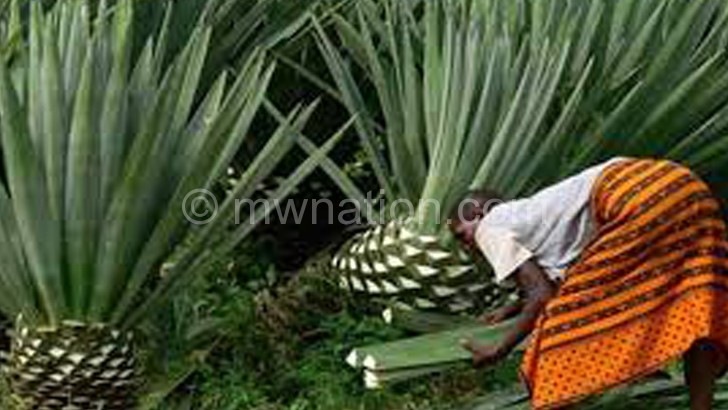Turning to sisal to save trees
Some locals in Mzimba have returned to sisal farming to reduce deforestation, especially loss of young trees.
It is no secret the country’s forests are vanishing faster than they are being replenished. Environmentalists are alarmed the country has one of the highest deforestation rates in southern Africa, with official estimates showing nearly three in 100 trees are cut down a year.
However, an unorthodox idea is gaining sway in Muthibulanga Village, T/A Mzikubola, where a mere sisal fence would lessen pressure poor households exert on surrounding forests.

“It’s true forests are being looted largely because many rely on trees for cooking, but we cannot win the battle against deforestation by cramping down charcoal and firewood business alone,” says Musamude Nkhoma.
One of the brains behind sisal growing since 2008, he reckons having the fibulous crop close to home will safeguard emerging trees, especially nkhorongo, from being split and felled by people searching for ropes.
“Sisal produces strong ropes, thereby reducing the trips people make into the forest as they hunt for trees with barks that have rope-like layers,” he clarified.
The traditional ropes, comprising a layer of fibres that lie under the barks, are known as mikusa or luzi in vernacular languages.
In many natural forests, it is not unusual to sight trees with deformed or torn-apart tips due to the tendency of extracting the fibres often used for strengthening fences, walls and roofs made of poles and grass. The ropes are handy when building huts, toilets, kitchen, bath shelters and tobacco sheds.
In Nkhoma’s neighbourhood, however, sisal is replacing the fencing materials harvested from waning forests.
Not only do people prefer ring-fencing their homes with sisal because it leaves their fields for food crops and other commercial plants at a time the amount of land per person is dwindling due to rapid population growth.
“Instead of carting trees and grass all the way from the hills, people just need to plant sisal on the perimeter of their household. Many prefer this because its thorny leaves keep away thieves and animals. It also has numerous other functions,” says the father of one.
Among the alternative uses, Nkhata fashions mops, doormats and brooms for sale from the leafy crop.
The rural dweller generates about K30 000 per month selling sisal ropes as well as the pieces of handwork he learnt at the one-time sisal-fringed Kamtelo Primary School.
The sum is no small change to the man. It’s lucrative.
“The money is bonus anyway. Sisal always regenerates when I peel off the leaves for whatever use. However, the trees will never be the same again if cut down or torn apart for luzi,” reasons Nkhoma.
Malawians may be far from churning out sisal for export as does Tanzania, but the crop’s untold role in conserving nature is one of the lessons onlookers ‘imported’ from an agricultural fair organised by Catholic Development Commission at Champhira recently. n





